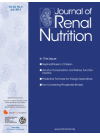Why the Nutritional Management of Acute Versus Chronic Kidney Disease Should Differ
Does eating less or more protein affect kidney health? To answer this question, it is important to better understand the pathophysiology of renal function as it pertains to protein intake. Consistent data in both animal models and human subjects suggest that a high-protein diet leads to dilation of the afferent arterioles of the glomeruli. This is usually the result of an amino acid surge in the circulation upon a protein-rich meal. Consequently, increased intraglomerular pressure ensues, which results in elevated glomerular filtration rate (GFR), a phenomenon also known as “glomerular hyperfiltration.” Hence, there are two important but opposing scenarios vis-à-vis the quantity of the dietary protein intake and kidney function: (1) Higher protein intake can increase intraglomerular pressure, which is useful in the short term when we eat a large protein meal with high-protein content, so that we can ensure effective clearance of nitrogenous end products that are produced from eating too much protein, but in the long term, the resultant glomerular hyperfiltration may cause wear and tear and more loss of nephrons in the kidneys.



